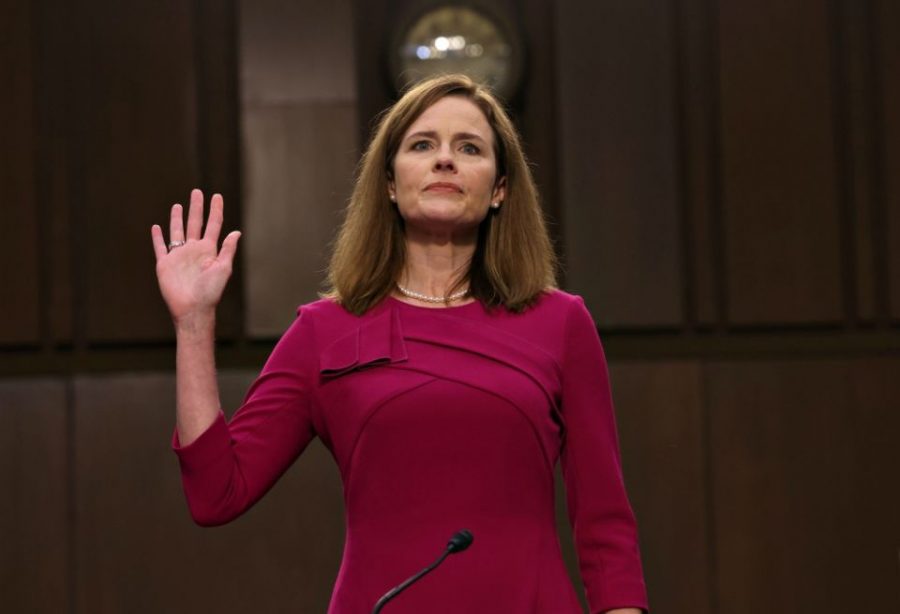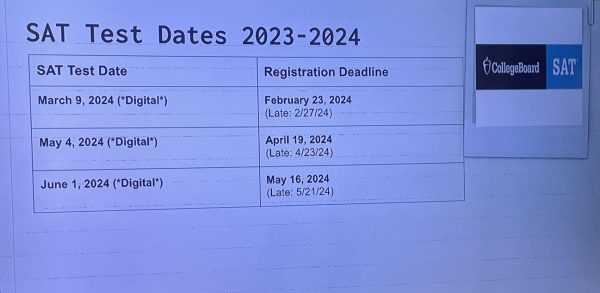Amy Coney Barrett sworn in as new Supreme Court justice member
This image was accessed via Google Images under the Creative Commons License.
Amy Coney Barrett swears the judicial oath prior to starting the confirmation hearings.
On the morning of October 27, 2020, Amy Coney Barrett was sworn in as the newest member of the Supreme Court of the United States. The judicial oath took place in the East Conference room of the Supreme Court. In spite of the public’s awareness of her becoming a Supreme Court justice, many people are not aware of Barrett’s background, and why her quick nomination and appointment caused controversy.
Barrett was born on January 28, 1972, in New Orleans, Louisiana. She was a Summa Cum Laude graduate of Notre Dame Law School in 1997, making her the top of her class and the only justice on the current court who has not received a law degree from an Ivy League school. She also earned the Hoynes Prize, which is awarded to those who have the best record in scholarship, application, deportment and achievement.
In addition, she was a professor at Notre Dame Law School from 2001-2002. While serving as a professor at Notre Dame, she was elected as a member of the American Law Institute, involved with the Federalist Society and the Notre Dame anti-abortion group faculty and voted as Distinguished Professor of the Year.
Barrett is married to prosecutor and fellow Notre Dame graduate Jesse M. Barrett, and she is a mother of seven children.
On May 8, 2017, President Donald Trump nominated Barrett to the 7th US Circuit Court of Appeals and she was confirmed by the Senate on October 31, 2017. During her three years in this position, she authored approximately one hundred opinions that bolstered her reputation as a textualist, one who believes the interpretation of the law is primarily based on the ordinary meaning of the legal text, and an originalist, one who the US Constitution as the authors intended and does not move with the times. Having served as former Supreme Court Justice Antonin Scalia’s clerk, she developed a national profile for her staunch conservative and Catholic beliefs.
Before she was approved by the Senate, Barrett had four days of Supreme Court confirmation hearings. During those four days, she was questioned on the following topics: the presidential election, abortion, healthcare and what changes she would bring to the court.
Assistant Principal Mr. Dunn noted, “The hearing was, for the most part, pleasant, as opposed to the Kavanaugh hearing which was an American shame. It was disheartening to watch. This was far more civil.”
Due to the presidential election and the uncertainty of whether or not the Republican party would remain in power, the Trump administration vetted their potential candidates and focused on Barrett. With the Senate’s approval, she was quickly nominated and appointed amongst much controversy because of what happened with the Obama’s administration’s appointment four years prior. In 2016, former President, Barack Obama, nominated Merrick Garland to the Supreme Court to succeed Justice Scalia, but the Senate denied that approval and stated that the next president should appoint the new Supreme Court justice.
Senior Brett Wrubleski stated his opinion in this matter by saying, “I think that the senate’s approval of Barrett was hypocritical of the Republican party. In 2016, the Republican party, including big names like Mitch McConnell, argued that it was unconstitutional for a president to appoint a justice this close to an election. These same Republicans also argued this year that the president has every right to appoint a justice whenever a position is available.”
On the contrary, AP Government and AP Economics teacher, Mr. Schwab, stated, “I think the Republican majority did what any political party would have done in similar circumstances. I don’t blame them for that. I think democrats would have likely done the same thing given a similar position.”
Overall, only time will tell how Barrett’s decisions as Supreme Court justice will influence the American society and whether she will be more conservative or remain impartial.
Over the years, Kaylyn’s passion for literacy blossomed and enabled her to develop exceptional writing skills. She remains a diligent hard worker to...











